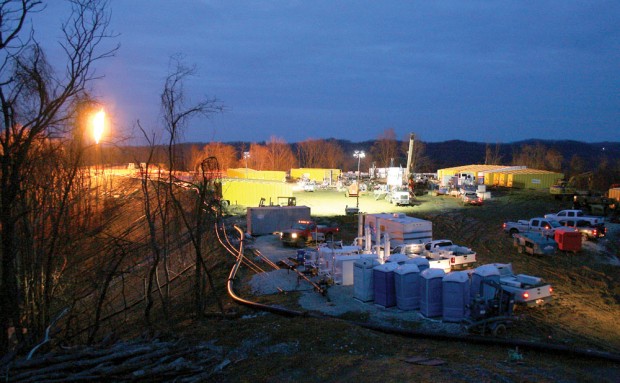However, no one disputes that an increasing number of wells are becoming contaminated in the Marcellus Shale region. Wetzel County resident Jeremiah Majors had to install a pipe in his water well to keep the methane from building up — a pipe he keeps lit to burn off the excess gas. Members of the Wetzel County Citizens Group have lit nearby Fish Creek on fire at a natural gas seep caused by drilling. The Oscar-nominated documentary Gasland is full of images of people lighting their tap water on fire.
On the eastern edge of the shale in Rockingham County, Va., Carrizo Oil & Gas withdrew its proposal for natural gas drilling after it met fierce local opposition. The George Washington and Jefferson National Forests in Virginia are also being targeted for fracking. The forests’ management plans are currently being rewritten, and many fear the area could be opened up to gas drilling.
“Of this entire issue, that is one of the things that keeps me up at night — the potential for hundreds of thousands of acres of public land to be leased for hydrofracking,” says Kate Wofford, executive director of the nonprofit Shenandoah Valley Network. She is anxiously anticipating the draft of the forest management plan, which should be released for public comment in the spring.
The Marcellus Shale is not the only place in the Southeast seeing increased interest from gas companies. In North Carolina, most activity is focused on the Deep River Basin, which runs from Durham to Charlotte. Though hydrofracking is presently banned in the state, a bill was recently introduced into the state legislature that would potentially legalize hydraulic fracturing, and gas companies are already signing leases, primarily in Lee County.
“There’s certainly pressure to bring it here,” says Geoff Gisler, a staff attorney with the Southern Environmental Law Center.
In Tennessee, gas companies currently hold mineral rights to most wilderness management areas in the state, and the Tennessee Department of Conservation has chosen not to regulate drilling.
At the federal level, the Fracturing Responsibility and Awareness of Chemicals (FRAC) Act was re-introduced earlier this year. It amends the Bush-era “Halliburton loophole” in the Safe Drinking Water Act that exempted gas drilling from regulation, and it requires companies to disclose all chemicals used in hydrofracking. The bill died in committee last session. The Environmental Protection Agency is studying the impacts of hydrofracking on underground drinking water supplies, but the final report will not be available until 2012.








